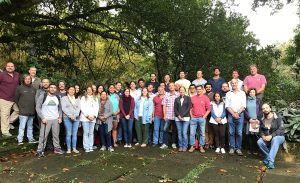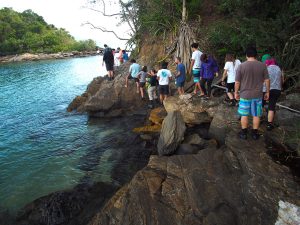Pole-to-Pole MBON & AmeriGEOSS
Praia do Segredo, São Sebastião, Brasil, August 6-10, 2018

The Pole to Pole Marine Biodiversity Observation Network of the Americas (P2P MBON) gathered researchers and managers from Canada to Patagonia and experts from other parts of the world, to discuss and converge on strategies for biodiversity monitoring and conservation in rocky intertidal areas and sandy beaches. The P2P MBON workshop took place at the Centro de Biologia Marinha da Universidade de São Paulo (CEBIMar/USP) during the 2018 AmeriGEOSS Week. This activity focused on capacity building and applied science for conservation and management of marine living resources emphasizing on four key areas:
1) field data collection using existing, standardized protocols;
2) manipulation of tabular and spatial data for standardized data formats, such as Darwin Core;
3) publish datasets to the Ocean Biogeographic Information System (OBIS, IOC) using established tools for data sharing; and
4) training on data science tools (R, Rmarkdown, Github) to mine data, conduct data discovery and analysis, and produce reproducible research documents with interactive visualizations on the web.
A core goal of the workshop was to develop a framework for biodiversity monitoring of sandy beaches and rocky shore intertidal areas. Eighteen P2P MBON members formalized their commitment to start (or continue) a monitoring program aimed at detecting changes biodiversity at their study sites following this set of essential principles:
1) use of common methods,
2) repeated sampling at the same sites,
3) similar seasonal and temporal sampling resolution,
4) data formatting following DwC schema, and
5) open data sharing via OBIS.

Participating countries include Canada, USA (mainland and US Virgin Islands), Costa Rica, Colombia, Brazil, Ecuador (mainland and Galapagos Islands), Chile, Brazil, Uruguay and Argentina. The first step will be for P2P MBON members to carry out at least one biodiversity survey at three sites in selected localities before the end of 2018. All data will be uploaded to the P2P MBON Repository by the end of February 2019 and made publicly available through OBIS during an upcoming workshop in spring 2019. The P2P MBON activity was led by the Institute for Marine Remote Sensing (ImaRS; University of South Florida), CEBIMar and Instituto de Biociências (IB) of the University of São Paulo in coordination with OBIS, the Global Ocean Observing System for Biology and Ecosystems (GOOS Bio Eco), and EcoQuants. This workshop was a first step for the implementation of a global P2P MBON network. P2P MBON will hold annual workshops focused on the advancement of the network’s objectives and output production.
Please see Workshop Report and Summary Report for more details.
